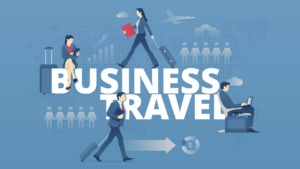Business travel plays a crucial role in today’s globalized economy, offering professionals the chance to connect, collaborate, and explore new opportunities. From attending international conferences to meeting clients and expanding into new markets, business travel is integral to personal and professional development. However, it also presents a unique set of challenges, including navigating new environments, managing tight schedules, and maintaining productivity while on the move.

The Benefits of Business Travel
Business travel offers a wealth of opportunities that contribute to career growth and organizational success. Key benefits include:
- Networking: Traveling for business allows professionals to meet colleagues, clients, and industry leaders from different parts of the world. Building strong relationships can lead to new partnerships, collaborations, and career advancement.
- Knowledge Exchange: Attending global conferences, workshops, and training sessions provides access to the latest industry trends, innovations, and best practices. This helps professionals stay ahead in their field.
- Market Expansion: Exploring new markets in person allows businesses to tap into new customer bases, fostering international growth and expansion.
- Cultural Understanding: Immersing oneself in different cultures enhances a deeper understanding of global business practices and customs, improving communication and collaboration across borders.
- Personal Development: Business travel fosters independence, problem-solving skills, and confidence, helping professionals grow both personally and professionally.
Challenges of Business Travel
While business travel offers numerous benefits, it comes with its own set of challenges:
- Time Management: Maintaining a work-life balance can be difficult when managing tight schedules, long hours, and multiple time zones.
- Travel Fatigue: Long flights, jet lag, and unfamiliar surroundings can impact physical and mental well-being, making it harder to stay productive.
- Costs: Business travel can be expensive, with flights, hotels, meals, and other expenses adding up quickly.
- Security Concerns: Traveling to certain regions may involve security risks, requiring extra vigilance and precautions.
- Environmental Impact: Frequent business travel contributes to carbon emissions, raising environmental concerns for both companies and individuals.
Tips for Successful Business Travel
To maximize the benefits of business travel and minimize its challenges, professionals can follow these strategies:
- Plan Ahead: Research your destination, book flights and accommodations early, and prepare a detailed itinerary to ensure a smooth trip.
- Pack Smart: Travel light by packing only the essentials, avoiding excess luggage, and saving on fees.
- Stay Connected: Ensure you have reliable internet access and communication tools, allowing you to stay in touch with colleagues and clients while traveling.
- Manage Jet Lag: Adjust your sleep schedule before your trip, stay hydrated, and use relaxation techniques to minimize the effects of jet lag.
- Embrace Technology: Utilize travel apps for booking flights, navigating unfamiliar cities, and managing itineraries to streamline your travel experience.
The Future of Business Travel
Although the COVID-19 pandemic temporarily disrupted business travel, it is expected to recover as global health concerns ease. Advances in virtual meeting technologies may reduce the need for some business trips, but the value of face-to-face interactions remains essential for building strong professional relationships and driving business growth.
Conclusion
Business travel continues to be a vital component of the global economy, offering professionals valuable opportunities for networking, knowledge exchange, and market expansion. By acknowledging the challenges and implementing effective strategies, professionals can make the most of their business travel experiences and achieve success on a global scale.